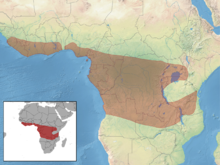Lord Derby's scaly-tailed squirrel
| Lord Derby's scaly-tailed squirrel | |
|---|---|

| |
| Scientific classification | |
| Domain: | Eukaryota |
| Kingdom: | Animalia |
| Phylum: | Chordata |
| Class: | Mammalia |
| Order: | Rodentia |
| Family: | Anomaluridae |
| Genus: | Anomalurus |
| Species: | A. derbianus |
| Binomial name | |
| Anomalurus derbianus (J. E. Gray, 1842) | |

| |
| Synonyms | |
|
Anomalurus beldeni | |
Lord Derby's scaly-tailed squirrel[1] (Anomalurus derbianus) is an anomalurid rodent native to Africa. It was named after Edward Smith-Stanley, 13th Earl of Derby.
Range and habitat
Lord Derby's scaly-tailed squirrel lives in tropical and subtropical rainforests in western and central Africa. It is found in Angola, Cameroon, Central African Republic, Republic of the Congo, Democratic Republic of the Congo, Ivory Coast, Equatorial Guinea, Gabon, Ghana, Kenya, Liberia, Malawi, Mozambique, Nigeria, Sierra Leone, Tanzania, Uganda, and Zambia.
Behavior
Lord Derby's scaly-tailed squirrel is nocturnal, and will sleep in nests in holes in trees. They live either alone or in pairs. They move around by extending their membrane and gliding from tree to tree. Flights of up to 250 meters (820 feet) have been recorded. They will use the scales on the bottom of their tails to help themselves climb in the trees. Lord Derby's scaly-tailed flying squirrels are mainly herbivorous, eating plant matter such as leaves, bark, green nuts, fruit and flowers.[citation needed]
References
- ^ a b Howell, K.; Hutterer, R & Ekué, M. (2017) [errata version of 2016 assessment]. "Anomalurus derbianus". IUCN Red List of Threatened Species. 2016: e.T1550A115056429. doi:10.2305/IUCN.UK.2016-3.RLTS.T1550A22183081.en.
- Animal diversity web on Anomalurus derbianus
- Corbin, C., and Cordeiro, N. J. (2006). Gliding characteristics of Lord Derby's Anomalure (Anomalurus derbianus) in Tanzania. African J. Ecol. 44: 106-108.
- Dieterlen, F. 2005. Family Anomaluridae. Pp. 1532-1534 in Mammal Species of the World a Taxonomic and Geographic Reference. D. E. Wilson and D. M. Reeder eds. Johns Hopkins University Press, Baltimore.

